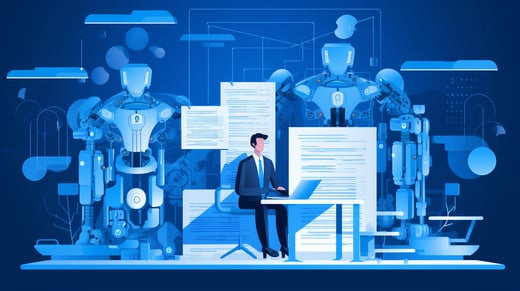We tackle familiar smokescreens for lack of legal tech adoption and separate fact from fiction.
A fear of the unknown
While most of us are more comfortable in familiar, expected scenarios, as a lawyer you may be particularly nervous when things change. After all, contracting is a process that ultimately creates an environment where everything is carefully constructed so that both parties are happy with the situation. When that status quo is broken, when disorder replaces order, it inevitably means more work for you.
Sure, you are trained to deal with the unexpected, and you legislate as much as possible for a wide range of circumstances. However, throwing something new into the equation invariably creates complications.
However, some changes are there to make your lives easier and result in less grind, not more. One such example is legal tech.
You will no doubt have heard about legal tech in one form or another. The fact that you are reading this blog shows that you have a passing interest at the very least.
We know that there remains a degree of scepticism around what technology can do for in-house lawyers. What is more, there is a genuine concern that investing in legal tech will open a “Pandora’s box” of IT management and systems upkeep. That a decision to use technology will change the very nature of the legal team.
Of course, this is far from the case. So let us look at common reasons for resisting change, and bust open five common legal tech myths.
Myth 1. My team will become more of an IT service than a legal one
You have told us that the pressure is on your legal team to do more with the same (or even less). The business expects fast service delivery, helping them to close deals faster and pull revenue into the business at an accelerated rate.
Legal tech makes this happen. It is designed to help you achieve your legal goals with greater speed and less stress. It complements and accelerates what you want to do from a legal perspective, and does not – and will not – alter the nature of the work you do.
Technology changes how you work, not the type of work you are expected to do. The difference is that technology such as ThoughtRiver will automate the tedious grind of manual contract reviews, so you can accelerate the time it takes to get to signature and carve out more time to strategic legal services.
Myth 2. I need to dedicate chunks of time for training
Our onboarding process is designed with the same philosophy as our platform – to make it as easy for you to see value as quickly as possible and with the minimum of effort. In fact, you can start reviewing common contract types from day one.
In the first week we train you how to upload contracts and use the system, while also introducing you to the training centre so you can learn at your own pace. In the background we begin uploading a selection of your existing contracts so the platform can start to understand your contracting policies.
The beauty of ThoughtRiver is that smart AI learns with each new contract that you upload, understanding how you and your lawyers approach risk and replicating that in its contract reviews. In other words ThoughtRiver is the entity concerned with ongoing learning, not you and your team. Once existing contracts have been uploaded and the platform trained, ThoughtRiver learns on the job, just as your team does.
Myth 3. I will no longer be a lawyer, but an IT specialist
We do not expect you to have excellent technical knowledge, and neither is it required. Just like the technology you already use in your lives – your smartphone, internet, Netflix etc – you do not need to have the faintest idea how it works from a technological point of view for you to appreciate the benefits.
ThoughtRiver is a cloud-based SaaS solution. That means we take care of all the technical necessities for you, including systems upkeep, maintenance, and fixing any bugs (as rare as they might be).
Remember that ThoughtRiver is designed to ensure you can spend more time doing what you do best, not less.
Myth 4. I am too busy to investigate legal tech opportunities
This is exactly the reason why you need legal tech! We know and understand how busy in-house legal teams are, and how easy it is to get caught in a vicious circle: you are so busy you desperately need to implement tech to relieve the pressure, yet you are too busy to find the time to make the best decision.
It is a situation that is unlikely to get better on its own. GCs say that workloads are expected to increase by 25% over the next three years, but headcount is only expected to increase by 3%. In other words, there will never be a perfect window to investigate your best legal tech options. The sooner, the better.
Why not speak to our friendly experts to help you understand exactly what sort of solution would best suit your needs? We can discuss your specific requirements, your key objectives, and identify what would give you optimal time to value.
Myth 5. The wider business does not understand why we need technology
Legal tech is not just for the legal team. When legal can boost productivity, speed, efficiency, and consistency, the benefits extend across the entire enterprise.
For example, sales can close more deals faster. Procurement can realise the full value of each carefully negotiated transaction. Revenue is pulled into the business quicker.
Non-legal colleagues can even undertake initial contract reviews themselves with no additional risk. ThoughtRiver is trained to scan and flag risky wording as an autonomous, automated platform. Whomever is uploading the contract is, to all intents and purposes, irrelevant. What matters is that AI identifies risk according to your existing contracting policies, and alerts the human lawyer to make the call on appropriate next steps. Your legal team always retains control.
Chances are the rest of the business is investing in technology to help them achieve their goals. For legal to follow a similar path will only boost the reputation of the department.
For example, according to an Ernst & Young report 61% of CEOs said they would like their legal departments to take a more data-driven approach to their legal department’s risk management practices. This is what ThoughtRiver enables, by digitising contracts and creating data-rich assets as part of the review process.
By getting onboard the tech train, in-house legal teams are taking the route that the rest of the business welcomes.
Now is the time to act
All these factors are combining to the point where any GC who does not consider leveraging technology to relieve the strain is at best missing a trick, and at worst adding to the problems within their team.
It is not about understanding every aspect of technology. You do not need to be a tech expert – you simply have to understand the benefits the tech offer your legal team, and subsequently the entire business.
Neither will tech adoption turn the legal team into a de facto IT department. We make it as simple as possible to seamlessly implement ThoughtRiver into your contracting workflows, removing the tedium of manual reviews and allowing you to accelerate time to signature.




